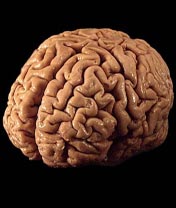Studies show the size of brain parts governs gaming ability
Bit of a no brainer

In the studies of the brain, there's always an assumed strong link between the size of your brain and intelligence. But across the animal kingdom this isn't always true, for instance when you compare an elephant with a human.
Now US researchers have found they could predict the skill level of amateur gamers just by measuring the volume of key parts of their brains.
So instead of overall size being a determining factor, it might be more to do with certain parts of the brain being disproportionately larger - which could explain the differences in cognitive ability between one person and another.
A multi-disciplinary team from the Universities of Illinois, Pittsburgh and Massachusetts gathered together 39 members of the public (29 women and 10 men) who had only played computer games less than three hours a week over the last two years.
They then had to play two types of game, both specifically developed for the experiment. One game had a specific goal for completion, the other had ever-changing priorities.
The MRI scan results showed participants performed best overall with larger, deep inner sections of the brain known as the caudate and putamen.
"This makes sense, because these areas have been linked to learning procedures and new skills, as well as adapting to changing environments," said Professor Arthur Kramer of the University of Illinois.
"These people could do a number of things at once. Think of it like driving a car, as well as looking at the road, you're tampering with your GPS, and talking to your passengers."
However those with a larger nucleus accumbens (the reward centre of the brain) outperformed others in the first few hours, possibly due to the "sense of achievement and the emotional reward" from the accompanying achievement of the earliest stages of learning.
The overall findings showed nearly 25 percent of the difference in performance could be predicted by measuring the volume of the brain.
So should you feel perturbed if your brain isn't as big as another fellow human? No, because as Timothy Bates of the University of Edinburgh said, "No matter what your brain size is it's what you do with it that counts."
"The person born with the large brain can easily be outstripped by someone with a smaller brain. No matter what your brain size is, it's what you do with it that counts. Just remember the hare and the tortoise."
Professor Kramer went on to say, "It has been shown that some parts of the brain are fairly plastic - they can change and develop. The more we learn about these structures and function the more we can understand the circuits that promote memory and learning. That can have educational benefits but also implications for an ageing population where dementia is an issue."
So it's not all doom and gloom, and let's be honest, unless you have an MRI machine in your front room it's impossible to ascertain this sort of in-depth knowledge of your brain anyway. Ignorance is bliss.
Aside from the interesting results, the experiment puts computer games in a slightly more positive light - at least from a scientific point of view.
"The great thing about using a video game rather than methodical cognitive tests is that it brings us a step closer to the real world and the challenges people face," Kramer added.
